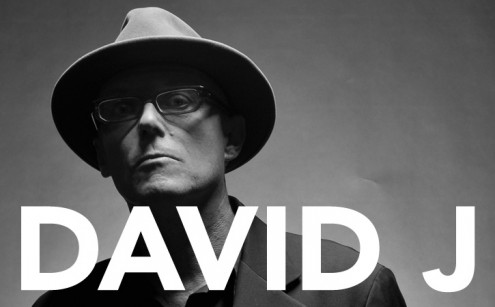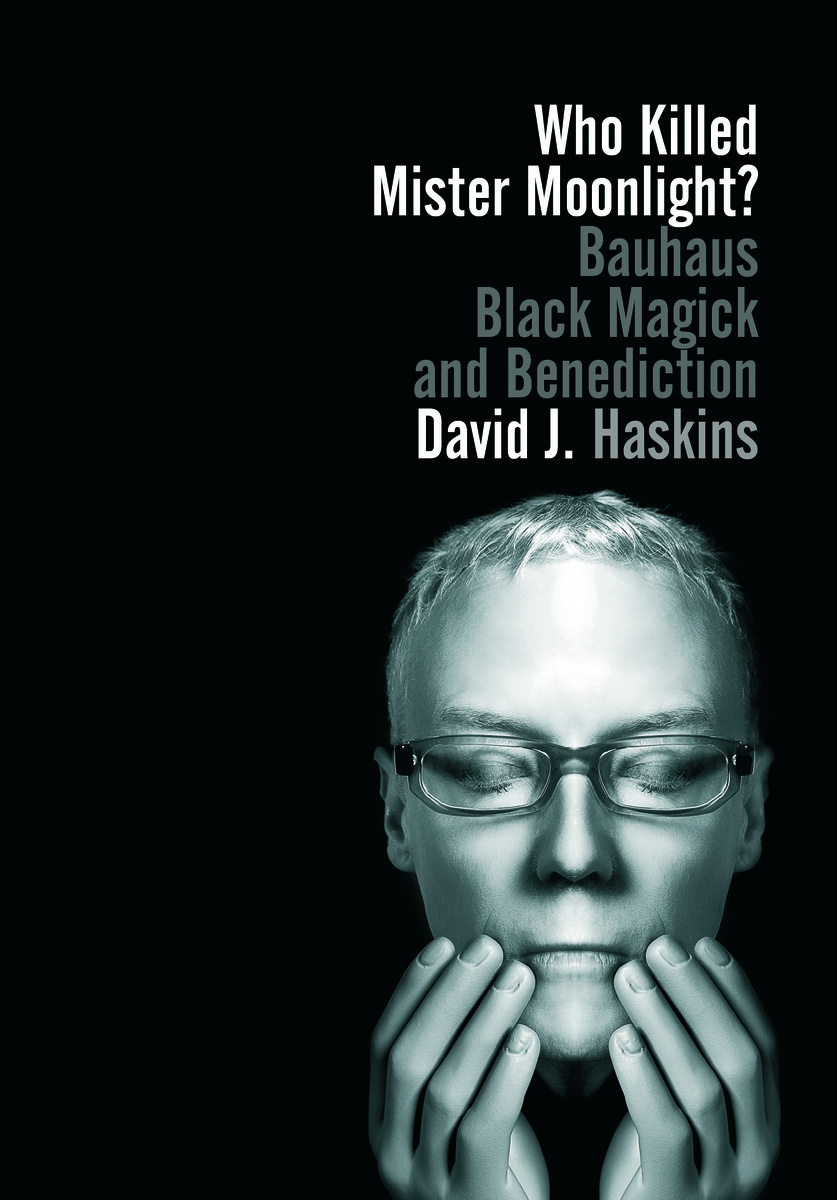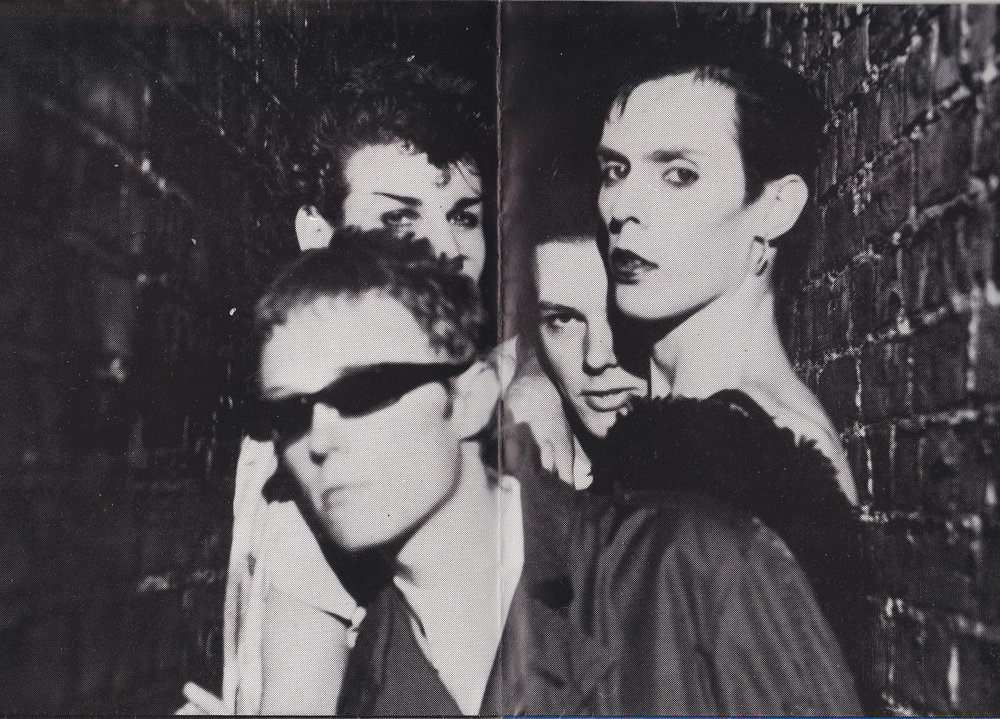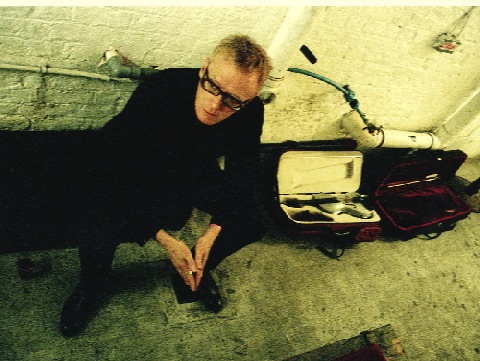D2D Interview: David J

When I talk about music from the 1980s with casual acquaintances or colleagues, it usually only takes a few minutes before they ask me how old I am; mainly because it's clear I'm speaking from a memory of that era. "I was born in 1979," I reply.
"But that means you were only six when this music came out!" is the shocked and awed answer I often receive. Yes, I was a child in what—to me—still remains the finest decade of music in rock history. But—let me tell you something about myself that my friends and family have long known—I remember MTV in the 80s better than just about anyone. I was a bonafide MTV addict from the time we got cable in 1985 until they stopped airing music videos in the late 1990s. While my second grade elementary school friends were listening to Greg & Steve, I was bumping Tears for Fears and Echo & The Bunnymen. My parents often had to ask the folks down at the local record shop if what I was listening to was appropriate for someone my age. I was on a first name basis with the manager of that store by the time I was eight. Sure, my brain cells have been ravaged by alcohol over the past decade, but let me tell you: from 1984 to 1997 there's nothing I can't recall about rock music.
Needless to say, when I was given the chance to talk with one of my childhood heroes (and, heck, still one of my current idols) about whisky, I was over the moon. While researching some information about a future Faultline project I'm currently working on (one that will become more apparent as the months go on), I felt there was one man who might be able to give me the answers I was looking for. As it turned out, not only was this man happy to help, he was a big fan of single malt whisky as well (and he was happy to talk about it!). David J. Haskins is one of the most influencial and dynamic rock musicians of the past forty years. The band he founded with his brother Kevin, along with friends Daniel Ash and Peter Murphy in the late 70s—Bauhaus, for those of you who don't know—basically paved the way for post-punk, goth, and industrial music in later years. There would be no Nine Inch Nails without Bauhaus. After Bauhaus split in the early 80s, David, Daniel and Kevin soon reformed under the name Love & Rockets, becoming even more of a commercial success than their previous incarnation. It was the hit single "No New Tale to Tell", sung by David himself, that captivated and converted me into a huge L&R fan.
In 1987, my mom drove me to The Wherehouse on McHenry Ave in Modesto to buy the Love & Rockets album Earth, Sun, Moon, whereafter I returned to my bedroom and listened to that tape on repeat for hours. In 1989, I distinctly remember driving back from the mountains with my dad, while bumping their new hit "So Alive" on the radio. Now, in 2015, David J and I were somehow going to talk on the phone about whisky. In preparing for the conversation I blew through David's incredible memoir Who Killed Mr. Moonlight? Bauhaus, Black Magick, and Benediction, which I highly recommend to anyone who loves music from that era, and came up with a list of questions I thought might be interesting for both music fans and lovers of fine booze. Let's hope I can get through the interview without crying or wetting my pants.

Driscoll: It’s great talking to you, David. I’m most excited because you’re an honest-to-goodness rock and roll guy who still drinks! There are a lot of guys who had to quit over the years. Most of the ones I’ve met, anyway.
David J: I’ve always enjoyed a good drink and as Tom Waits once said: “I don’t have a drinking problem, only when I can’t get a drink!” If I’m writing a song then I find that a nice glass of whiskey really helps to fuel the creative flow. I never drank when writing the book though. That was done whilst following a strict three hour per day regimen and I would only have a drink at the end of the day when I had finished writing. Generally speaking, these days moderation is the key. I give myself at least two days every week where I don’t drink anything at all and I love the clarity that comes with that.
Driscoll: What are you most into drinking these days?
David J: I’d say my standard drink is Jameson. Just plain old Jameson Irish whiskey; no ice, splash of water. I’m rather partial to single malts though.
Driscoll: Any one in particular?
David J: Yeah, I really like Lagavulin. In fact, I can tell you a funny story about the first time I tried Lagavulin if you want to hear it.
Driscoll: Of course!
David J: It was in the early 90s and I was in LA working on an album with T-Bone Burnett. He had invited me out to lunch at this organic restaurant that he was raving about. I ordered a salad. When it showed up, however, I noticed that there—amidst the leafy greens and vegetables—was a big, furry moth with its wings splayed and curly orange antennae soaking in oil. This wasn’t a normal moth either, this was something exotic—like from a museum. It was huge. At first I wasn’t sure if I was hallucinating or not, so I looked at T-Bone and I said to him, “I’m sorry, T-Bone, I know you said that this place was organic but I think this is bit much! Look at this salad and tell me what you see?” “Oh my God!” He exclaimed. So we called the waiter who also said, “Oh my God!” and whisked the plate away immediately. “So sorry, sir! You can have anything you want on the menu for free,” said he, but by then I had lost my appetite. So we split out of there and at T-Bone’s suggestion went down to a local liquor store where he bought a bottle of Lagavulin. As we sat in his car in the parking lot, he described the three stages that we were about to experience: the initial palate, and then the soulful glow, and finally the warm expansive finish with all the peat smoke. “It’s eternal!” He passed me the bottle and I took a swig then passed it back to him and he followed suit. The description was accurate and it’s been a favorite ever since.
Driscoll: I think it’s great that you remember exactly where you were when you first tried Lagavulin. One of my favorite things about booze is that we often link some of our favorite memories to what we were drinking at the time.
David J: Yes, unless we drink far too much and then we can’t remember anything at all! Fortunately this has hardly ever happened to me.
Driscoll: And there are some great moments in your book where you talk about drinking: the time you and Daniel Ash were driving to a show, opened up cans of Carlsburg in the car and then, when they were half empty, filled the other half up with Cognac. The time when Nico met you and the rest of Bauhaus at the studio with a bottle of mezcal. The time you were holed up in New York with those Swedish girls, eating hamburger meat and drinking vodka. Those are great memories and great stories!
David J: And also the time I met William Burroughs at his house in Kansas and he took me on a snake hunt, while drinking huge tumblers of vodka and Coke.
Driscoll: That, too! We all have such great memories of where we were during special moments. Like we all remember the first time we got drunk.
David J: I’ll tell you that story. When we were little kids, my brother and I used to take nips from the miniature bottles that my mum collected—we would fill them with water afterward so that she wouldn’t notice—and I remember the time when a friend of ours came over when our parents were out and we all got drunk on Bell’s Whiskey. This was in 1972 so we were in our early teens. We were blasting Bowie’s "Ziggy Stardust" and having a whale of a time. By the time my parents came home we were absolutely blotto. Our friend had passed out on the carpet, my brother was puking up in a wastepaper basket and I was watching the room spin. My mother couldn’t help but laugh hysterically about the whole situation—although you could tell she didn’t want to—but my dad wasn’t too pleased at all. That’s when our little pal was sent home with his tail between his legs; and his head between his legs, too!
Driscoll: It’s great that you were interested in the bottle of 1988 Blair Athol we did with Signatory because that’s the distillery where Bell’s is made.
David J: Well then it looks like I’ve come full circle!
Driscoll: Have you ever had to go out on the road with other musicians who don’t drink? I can’t imagine what it would be like to travel and not feel comfortable drinking around other folks who are trying to get sober. In your book, you mentioned Trent Reznor’s no-drug policy while touring with Nine Inch Nails in the late 90s. That didn’t apply to alcohol, did it?
David J: No, certainly not (laughs). I really can’t imagine doing a show without having a drink or two before hand just to take the edge off. I have played shows where I was stone cold sober and it feels very strange indeed. The worst thing though is when you’ve had too much and it impairs the performance. You feel like you’re cheating the audience and yourself. That hasn’t happened in a very long time I’m pleased to say.

Driscoll: What was the drink of choice when on the road? Was there an alcohol of choice with Bauhaus that maybe changed when Peter Murphy was no longer with the group?
David J: We definitely started drinking more when touring as Love and Rockets than we did as Bauhaus. Although, we always really liked Champagne when we could afford it. We would have a crate put by in the studio, which we would pop once the album was done. One time Peter necked all the bottles during the two weeks we were working—this was when we made The Sky’s Gone Out. We went to enjoy that satisfying celebratory end of the session carousal and there were just empty bottles and discarded corks (laughs). We called him “Lord Champagne” after that. With Love and Rockets the poison of choice was Screwdrivers.
Driscoll: Vodka was big in the 80s. That was the drink, right?
David J: Yeah, it was. I drank a lot of vodka at that time, but later—in the 90s—I switched over. To the dark side, you could say. Speaking of which, what was the deal with that Bauhaus whisky I saw online?
Driscoll: You mean the post I did with the “Dark Entries” video?
David J: That one, yes.
Driscoll: I thought the name “Dark Origins” was rather sinister and the bottle was rather gothic. Plus, I thought the mysterious hooded figure on the canister looked like you a bit. That was one of the really interesting parts of your book, by the way. The openness with which you talked about that night at graphic novelist Alan Moore’s house and your experiences with the occult. I thought it turned your book from just another memoir about music into a really telling and honest presentation of who you are as a person.
David J: Well, it’s an essential part of the story and I feel that it’s important to talk about everything and to be honest when you’re writing. That attitude is something that is certainly endorsed by Alan. Also, and I don’t want to sound pretentious, but when you can look unflinchingly at all experience and not shy away from the dark and the taboo then that is very valuable and it is how we learn about life and being human and what that really means. With the taking of drink and some drugs can come an intimation of transcendence and the divine. Although I think that illumination can only be a pale, pale shadow of complete enlightenment but valuable none the less. It’s that whole thing of Arthur Rimbaud’s "systematic derangement of the senses".
Driscoll: That reminds me of the part where you talk about drinking absinthe in Prague and were visited by the Green Fairy in a vision.
David J: Right; that was an extraordinary experience. Have you ever seen the lady?
Driscoll: No, but I completely agree with you about absinthe being an entirely different drunk; a totally different feeling. The first time we drank absinthe as a store when the ban was lifted in 2007 was quite special. We were all so happy and communal that evening. I remember people calling me later that night, after leaving my house, just to let me know how happy they were. It was unreal. Each person felt the need to reach out; successively, and unprompted.
David J: The effect of absinthe is certainly quite narcotic. There’s a spirit there with which it is possible to commune I am sure and like most of these spirits, mescal and mushrooms come to mind, she needs to be approached with respect.

Driscoll: What’s one of the more special moments you’ve shared with someone while drinking? Maybe one that wasn’t in the book?
David J: Ok. Back in the early 90’s I had just arrived in New York City to work on a solo record and when I got into my hotel there was a message at the front desk from my friend, the producer Hal Willner, inviting me over to his his apartment. ‘Come over. Alan’s here!’ it said. I knew that Hal had been working with Alan Ginsberg and I thought, ‘could it be?’ I made a B-line down to the East Village, picking up a copy of ‘Howl’ on the way. Sure enough, when I arrived, there was Ginsberg sitting on the sofa! He patted the seat next to him and I sat down. What followed was a fantastic evening of poetry, song, and very good wine.
Driscoll: I would have loved to have met him. Is there anyone that you haven’t met, someone that you wish you could have shared a drink with?
David J: Leonard Cohen. I would love to share a bottle of red wine with him in his little kitchen. Also, possibly Shane MacGowen. Although I fear that I wouldn’t get out alive!
Driscoll: I think it’s great that you got to spend so much time with Genesis P-Orridge. That’s a guy I would love to have had a drink with. Back in the Throbbing Gristle days. I remember seeing the video for “Discipline” as a high school kid in Modesto. That blew my mind.
David J: Now there’s someone who has fully embraced the whole notion of the questioning taboo and the systematic derangement of the senses. To an heroic degree.
Driscoll: What’s the drinking plan for tonight? I don’t want to keep you much longer. You’ve already been so generous with your time.
David J: It’s no bother, really! I’m enjoying this, it’s a bit different from the interviews that I usually do. In fact, it’s making me feel like pouring a wee dram right now. Although, it’s a bit early for me, I have to say. I like to wait until at least five o’clock these days. Unless I’m watching English football early in the morning at 6 AM. Then it’s down to the pub for a pint of Guinness.
-David Driscoll
